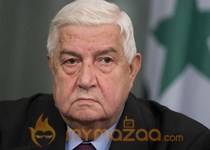India is likely to say it has “no interest” in sending troops to Syria to fight in any of the anti-IS coalitions, but could indicate it is open for a bigger role in the Syrian regional reconciliation in West Asia, officials have told The Hindu. The issue is expected to be discussed when Syrian Deputy Prime Minister and Foreign Minister Walid al Moualem meets both National Security Adviser Ajit Doval and External Affairs Minister Sushma Swaraj during a three-day visit to New Delhi that begins on Monday.
Diplomatic sources said the visit is significant as it comes just ahead of a series of trips by the Modi government focused on West Asia. Later this week Ms. Swaraj will travel to Israel and Palestine ahead of expected visits by leaders of both countries to India. Prime Minister Modi is likely to visit Saudi Arabia “shortly”, and could visit to Iran later in the year, sources confirmed.
A Syrian official said Mr. Moualem could ask India to play a “conciliatory” role in reconciling the positions of all the major players in the region, given India’s standing with them.
While officials said India “is open” to discussing the larger role of assisting the peace process, the government has taken a considered position against joining any of the coalitions fighting the IS in Syria and Iraq. The Hindu has learnt that the Prime Minister’s Office listened to a series of briefings in the last few weeks on India’s options in the Syrian civil war . Apart from presentations on the spread of IS terrorism to Afghanistan, and the possibility of radicalisation in India, the briefings from top security agencies included a look at the three different coalitions now engaged in the fight against the radical terror group — the U.S.-led coalition of more than 60 countries that are conducting strikes on IS locations and supporting anti-Assad rebel groups, the Russian forces sent in to support President Assad’s Syrian military forces against IS and other groups, and the newly announced Saudi Arabia-led coalition of 34 Muslim nations, which claims it will attack IS as well.
The considered opinion of military and intelligence officials was that it would be inadvisable to offer any operational support beyond the current intelligence that has led to several IS-bound Indians to be apprehended. A senior official who was privy to the briefings told The Hindu, “We will also not do anything that could lead to the spread of IS terror inside India.”
Officials also rejected the possibility of joining a “ceasefire-monitoring mechanism” outside of the UN mandate, given pressure from the U.S. to join its coalition. Speculation over Indian support has been growing since Defence Minister Manohar Parrikar spoke on the issue on his return from a visit to U.S. naval facilities and meetings in Washington. “We have made it clear that if there is a UN resolution and if there is UN flag and a UN mission, then as per India’s policy to operate under UN flag, we will participate,” Mr. Parrikar had said.
“India is not interested to send troops as of now. If Syrians seek support, India can provide them indirect support," a senior official said, referring to humanitarian aid, agricultural support and financial aid to develop its energy interests. "Syrians have offered oil fields to India. India is interested but the security situation is difficult. But India would prefer to purchase oil fields from Syria now and keep them frozen for future use," the official confirmed ahead of Mr. Moualem’s visit.
Mr. Moualem who is accompanied Syria’s Vice-Foreign Minister, leads the most senior Syrian delegation to visit India since the civil war began in 2011. He will be followed closely by another key figure of the Assad regime, advisor Bouthaina Shaaban, a regular visitor. According to diplomatic sources, Syrian President Bashar al Assad has been grateful of India’s position on Syria, opposing the U.S. and allies demands for regime change, while also refusing to criticise Russia’s military support to the Syrian military campaign.
While there was some pressure on India to do both, as well as a request from the Obama government to join the anti-ISIS coalition, India has resisted all three requests so far.







